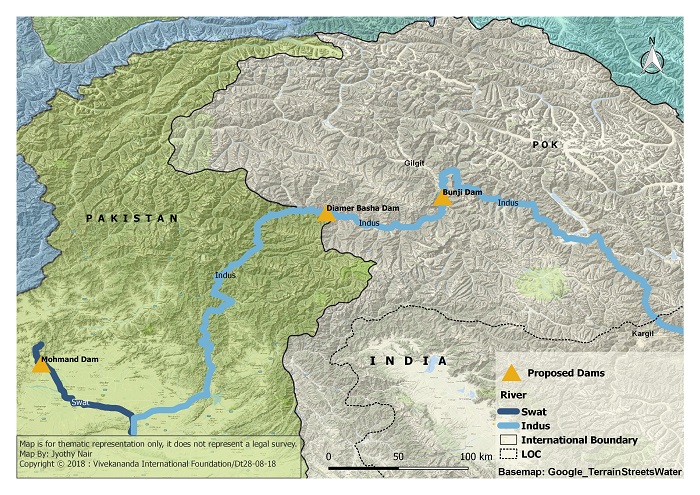Arvind Gupta, Director, VIF
 So dire is Pakistan’s financial health that it has been reduced to mobilise money from individual donors to build infrastructure projects which will cost hundreds of thousands of crores of rupees. In his first speech after becoming the Prime Minister, Imran Khan said that Diamer-Bhasha Dam was crucial for Pakistan and needed to be built. Acknowledging that Pakistan has no money, he said that the Dam will be built with donations from Pakistanis within the country and overseas.
So dire is Pakistan’s financial health that it has been reduced to mobilise money from individual donors to build infrastructure projects which will cost hundreds of thousands of crores of rupees. In his first speech after becoming the Prime Minister, Imran Khan said that Diamer-Bhasha Dam was crucial for Pakistan and needed to be built. Acknowledging that Pakistan has no money, he said that the Dam will be built with donations from Pakistanis within the country and overseas.
Diamer-Bhasha dam is a gigantic project by any standards. Conceived during Musharraf’s time in 2007, this PKR 895 billion, 272m high project with a storage capacity of 8.1 million acre-feet of water is designed to generate 4500 MW of electricity. Located over the Indus River, the dam is considered to be vital for water and energy security needs of the country.

Although the foundation of the dam was laid in 2013, generating funds has been a huge problem. The Asian Development Bank (ADB) and the World Bank have refused to fund the Dam as it is located in Gilgit Baltistan, a part of Jammu and Kashmir, considered to be disputed territory by the international funding agencies. The Chinese also backed out of the project in 2017 due to doubts about its financial viability. The project was not included in China Pakistan Economic Corridor portfolio.
With no viable funding options available, in July 2018, the Supreme Court of Pakistan intervened and directed the Government of Pakistan to set up a special fund with the help of donations from Pakistanis within the country and outside to help build the Dam. The State Bank of Pakistan set up an account fund for Diamer and the associated Mohmand dams. The fund is being monitored by the Supreme Court. Reportedly, Pakistan’s Chief Justice donated PKR 1 million for the fund. So far about PKR 118 crores have been received in the fund, mostly from Pakistanis within the country and about PKR 2 crores from overseas Pakistanis.
The Diamer Bhasha dam episode highlights the urgency of water and power scarcity in the country. According to a report put out by the Pakistan Council of Research in Water Resources (PCRWR), “the country may run dry by 2025 if the authorities didn’t take immediate action”. Pakistan crossed the “water scarcity line” in 2005, the report said. Pakistan has sought to create a large water storage capacity through construction of several dams. According to the Water and Power Development Agency (WAPDA) of Pakistan, six hydroelectric projects are “under construction” and another six are “ready for construction” including the Diamer Bhasha (4500 MW), Mohmand (800 MW), and Bunji (7100 MW). Funding has to be tied up for these projects.
Given the difficult state of the economy due to a crushing debt burden and mounting debt servicing requirements, Pakistan Government is left with little flexibility to spend on socio-economic and infrastructure projects. Pakistan’s ability to mobilise funds from abroad is also limited because internationally Pakistan’s image has suffered as it has not been able to satisfy the Financial Action Task Force (FATF) about the effectiveness of the actions it has taken to stop money laundering which eventually funds terrorism. Pakistan is in the ‘grey list’ of FATF at present. It may be moved to a so-called ‘black’ list of countries described in FATF terminology as the list of ‘Non-Cooperative Countries or Territories’ (NCCTs). This will make it even more difficult for Pakistan to raise funds from abroad.
Over the years Pakistan has been borrowing money to repay its debts. It may have to approach the International Monetary Fund (IMF) once again for a massive bailout package. To get it, it would have to be politically on the right side of United States with whom its relationship has come under fresh strains over the issue of terrorism. Living in denial on terrorism is not going to help Pakistan economically and financially.
Imran Khan wants to make Pakistan an Islamic welfare state but has insufficient resources to do so. Donations may help build cancer hospitals but not dams. Pakistan will need to put its own house in order first. Curbing terrorism would be a good start point.
No comments:
Post a Comment